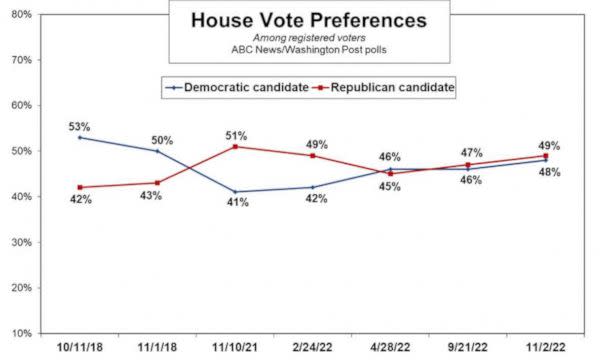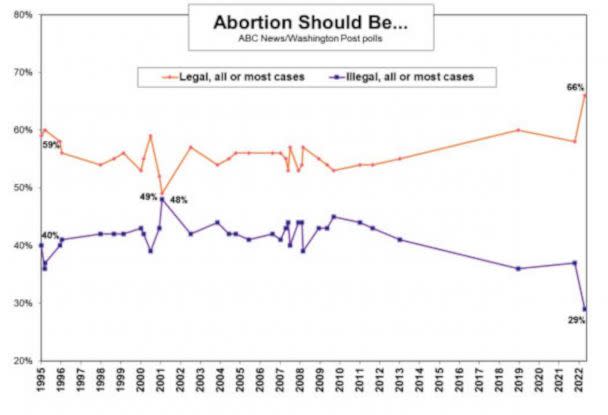Economic discontent and President Joe Biden’s unpopularity continue to fuel Republican prospects in the closing days of the 2022 midterm election campaign, with the share of Americans saying they’ve gotten worse off financially doubling since Biden took office, according to the latest ABC News/Washington Post poll.
Given inflation stubbornly near a 40-year high, 80% of likely voters in the ABC/Post poll call the economy a top issue in their vote for Congress; 77% say the same about inflation specifically. The Republican Party leads the Democrats by a dozen or more percentage points in trust to handle each — and by even more on another issue: crime.
The Democrats reply with a significant lead in trust to handle abortion. In a striking result, the number of Americans who say abortion should be legal in all or most cases has surged to 66%, the highest in ABC/Post polls since 1995. That is up 8 points just since April, two months before the U.S. Supreme Court eliminated the constitutional right to an abortion. The change came almost exclusively among women.
See PDF for full results, charts and tables
The public continues to oppose the high court’s decision by 2-1 in this poll, produced for ABC by Langer Research Associates. But while 62% of likely voters call abortion a top issue in their vote, that trails the economy by 18 points, inflation by 15 and crime by 7. Still, the abortion issue may have prevented the GOP from fully nationalizing the election around the issue of inflation — keeping the eventual outcome, state-by-state and district-by-district, uncertain.
Voter preference
All told, 49% of registered voters favor the Republican in their congressional district, 48% the Democrat. It’s a similar 50%-48% among likely voters. That marks a retreat from a 7-point Democratic advantage, 50%-43% among registered voters, in the last ABC/Post poll before the 2018 midterms, when the Democrats romped.
That said, the Democrats’ position is less dire than a year ago, when the Republicans held their largest midterm lead (51%-41%) in 40 years of ABC/Post polling.
MORE: As voters fret the economy, Dems narrow in on new message: Save Social Security, Medicare from GOP
Election results can differ from pre-election estimates, and the ultimate change in House seats is an open question in any case; local issues can matter, and among other factors, typically at least 90% of incumbents are re-elected. Results in the Senate, likewise, can’t be discerned until the voting is done.
But clearly, the Democrats face stiff headwinds. Forty-three percent of Americans say they’re worse off financially than they were two years ago — up dramatically from 20% in the 2020 national exit poll and 14% in 2018. Just 18% now say they’re better off — less than half what it was when Biden won office.
Biden himself has a 41% approval rating among all adults — essentially the same as Trump’s 40% heading into the 2018 midterms, with attendant losses for his party.
As noted in our previous analysis, when a president’s approval rating has been less than 50%, his party has lost, on average, 37 House seats in midterms since 1946. When it’s been over 50% — a level Biden hasn’t seen in a year and a half — average losses have been far milder (14 seats).
Another feature is the increasing size of swings from presidential to first midterm elections, suggesting heightened dissatisfaction with both sides. Trump’s party lost 42 House seats. His predecessor, Barack Obama, lost 63 House seats (at a time of 9.6% unemployment). That’s an average of 53 lost seats in these two most recent first midterms — double the average losses (25 seats) in the 11 preceding first midterm elections since 1946.
Election denial
On Biden, it’s worth noting that disapproval of his job performance is a different thing from rejecting his election two years ago. Similar to previous results, the public by 62%-36% expresses confidence that Biden was legitimately elected. That includes 48% very confident vs. 24% not at all confident.
MORE: How Donald Trump is shaping the midterms for Republicans
Election denial does play in the GOP base — just 26% of Republicans say they are confident Biden legitimately won. But confidence jumps by 40 points, to 66% among independents, as well as to 95% among Democrats.
On the main issues
Overall, the public trusts the parties about equally to handle “the main problems the nation faces” — 42% pick the Republicans, 40% the Democrats. But that’s a question on which the Democrats more often have led, by an average of 5 points in ABC/Post polls since 1982.
On individual issues, divisions are sharp. Registered voters trust the Republican Party over the Democratic Party by 14 points to handle the economy, by 12 points to handle inflation, and — by the widest GOP margin — 20 points to handle crime.
MORE: Biden doubles down on midterms message that Republicans would make economy worse
For its part, the Democratic Party leads widely on two issues, both of which rate lower in importance — a 13-point advantage on abortion and 19 points in trust to handle climate change.
On three other issues — education, immigration and threats to democracy — trust in the parties is divided more evenly.
There’s partisanship in the levels of importance placed on these issues. Among Republicans, 93% call the economy a top issue in their vote, 90% say so about inflation, 86% crime and 77% immigration.
Far fewer Democrats cite any of these: the economy, 71%; inflation, 67%; crime, 58%; and immigration, 51%. Instead, Democrats are far more apt than Republicans to pick abortion (81% vs. 47%) and climate change (75% vs. 20%) as top issues.
Gender gap
There’s a vast gender gap in vote preferences, and it’s grown sharply.
Women support Democratic over Republican candidates by 59%-39% now, compared with 50%-42% in the last ABC/Post poll in September.
That’s matched by a countervailing result among men — they now more broadly favor Republican candidates, 59%-36%, compared with 52%-42% then.
The result is that overall vote preference, among women and men combined, is almost identical to September’s.
MORE: Americans express broad concerns about the risk of political violence: POLL
The 9-point Democratic vote gain among women overall includes +16 points among suburban women. At the same time, overall vote preferences among suburban women almost exactly match those among women overall.
The gender gap between men and women also is reflected in differing priorities and trust levels. Big majorities of women and men alike pick the economy as a top issue, but women divide evenly in which party they trust to handle it, while men favor the Republican Party on the economy by a broad 61%-28%.
On abortion, the tables turn: Women trust the Democrats over the Republicans to handle abortion by 59%-31%; men divide about evenly, 41%-45%. And 76% of women call abortion an important issue in their vote, while just 47% of men say the same.
Abortion
It’s challenging to assess the impact of abortion on the election. On one hand, opposition to the Supreme Court ruling is widespread and, as noted, support for legal abortion has jumped to a record high, with essentially all the gains among women. Propensity to vote, too, is up among women, from 71% in September to 79% now, while steady among men. (In September, that was those certain to vote; now, it’s those certain or who already voted.)
MORE: Do voters care about abortion heading into midterms?
Still, no more people overall are calling abortion highly important in their vote now than six weeks ago — and as noted, it’s disproportionately Democrats (and women) who do so. In another measure, supporters of the Supreme Court ruling are more apt to say they’ll vote (or have voted already) than are critics of the decision (82% vs. 73%).
Regardless, some changes in support for legal abortion are remarkable. It’s now 74% among women, up from 62% last spring. (That compares with 57% among men, vs. 55% previously.) It’s up especially steeply among non-evangelical white Protestants (+21 points to 81%), in the South (+16 points to 64%) and in states that voted for Trump in 2020 (+15 points to 63%).
Among Republican women, support is up 15 points, to 43%, while those saying abortion should be illegal in all cases has dropped from 34% to just 10%.
Further, in the 14 states that have ceased nearly all abortion services, 63% now support legal abortion, up 20 points since April. It’s 67% in all other states, essentially steady.
Who and why
One further election-focused result shows somewhat more affirmative voting among Democratic voters than among those supporting Republican candidates.
Fifty percent of those backing Democratic candidates say they’re mainly showing support for the Democratic Party rather than opposition to the GOP (28%), or some of both (15%). Among Republican voters, slightly fewer (42%) are voting mainly to show support for the GOP. Again 28% mainly oppose the other party, while 21% hold both motivations.
A last open question — and the critical one in any election — is who shows up, especially with the rise in early and absentee voting. In this survey, conducted from Oct. 30 through Nov. 2, 13% of registered voters say they’d already voted. That’s essentially the same as at this point in 2018, when midterm turnout hit a postwar high.
Methodology
This ABC News/Washington Post poll was conducted by landline and cellular telephone Oct. 30-Nov. 2, 2022, in English and Spanish, among a random national sample of 1,005 adults, including 881 registered voters. Results have a margin of sampling error of 4.0 percentage points, including the design effect. Partisan divisions are 31%-29%-35%, Democrats-Republicans-independents, among registered voters.
The survey was produced for ABC News by Langer Research Associates, with sampling and data collection by Abt Associates of Rockville, Md. See details on the survey’s methodology here.
Economic discontent fuels GOP hopes as midterms draw to a close: POLL originally appeared on abcnews.go.com
Source: Read Full Article






